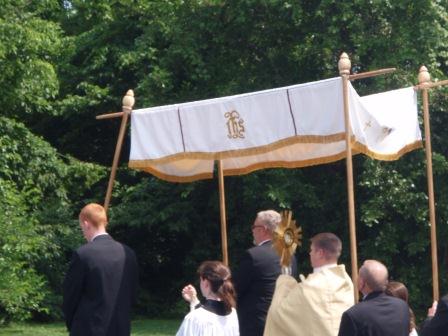40 Hours

Although the precise origin of the FORTY HOURS DEVOTION, (also calledQuarant' Ore) is not known for sure, there are certain facts which points to May, 1537, in Milan, Italy, when the Archbishop of Milan asked the inhabitants of the city to pray in front of our Lord's Most Sacred Body in order to appease the anger of God, provoked by the offenses of Christians, and in order to bring to nought the efforts and machinations of the Turks who were pressing forward to the destruction of Christendom. The practice without doubt spread rapidly, though the details cannot be traced exactly. We know that before the 1550, St. Phillip Neri established this practice for the Confraternity of the Trinita; and St. Ignatius of Loyola encouraged the practice of the exposition of the Blessed Sacrament during a carnival as an act of expiation for sins committed at that time.
The number forty has always signified a sacred period of time: the rains during the time of Noah lasted 40 days and 40 nights; the Jews wandered through the desert for 40 days; our Lord fasted and prayed for 40 days before beginning His public ministry. The Forty Hours Devotion remembers that traditional "forty hours period" from our Lord's burial until the Resurrection.
This Devotion is celebrated by a special forty hours period of continuous prayer made before the Blessed Sacrament in solemn exposition. Affirming our belief in the real presence of our Lord in the Blessed Sacrament, the Vatican Council II taught that the Holy Eucharist is the "source and summit of the Christian life" - (Lumen Gentium #11) "While the Mass is the central act of worship for us Catholics, an act which participates in the eternal reality of our Lord's passion, death and resurrection, Vatican Council II also upheld and encouraged the adoration of the Blessed Sacrament outside of the Mass.
There are 4 main purposes for this devotion:
-- adoration and glorification of our Lord
-- protection from evil and temptation
-- reparation four sins and those of the souls in purgatory
-- deliverance from political, material or spiritual calamities.
Adoration of our Eucharistic Lord provides a holy opportunity for the spiritual growth of those who practice it, for the parish as a whole, and for the world. In a world where temptation and evil abound, where devotion to the Mass and our Lord in the Holy Eucharist have declined, where the practice of the Sacrament of Confession has been forgotten by too many, it is important, more than ever before, to seek God's graces for conversion that come from this pious devotion.

